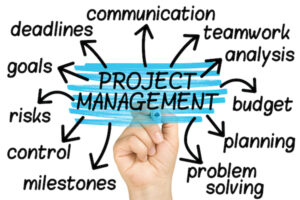Introduction
Its modern form, project management dates back to the early 1950s, although its roots go further back to the latter years of the 19th century. As businesses realized the benefits of organizing work around projects – recognizing the critical need to communicate and coordinate work across departments and professions – a defined method of project management emerged.
Many organizations today don’t employ full-time project managers. Indeed, it’s common to pull together a project team to meet a particular need, one that usually involves producing an end product or service that benefits the organization or effects change. The end result can be tangible or intangible.
Getting to that end result, successfully, is what project management is all about. At its core, then, project management centers on the planning and control of everything involved in delivering the end result – and it’s a process that every person on a project team needs to embrace, understand and execute, no matter the experience level. project coordinator jobs
Even if you lack academic skills in a project methodology, taking a role in a project team provides an excellent learning opportunity, one that can improve your career profile.
Even if you’re an experienced manager or team member, a review of the critical – and most basic – elements of project management can inform and improve how effectively you take projects from concept to concrete plan and through to completion.
Definition
A simple definition of project management includes a handful of key premises:
- Project management is no small task.
- Project management has a definite beginning and end. It’s not a continuous process.
- Project management uses various tools to measure accomplishments and track project tasks. These include Work Breakdown Structures, Gantt charts, and PERT charts.
- Projects frequently need ad-hoc resources rather than dedicated, full-time positions common in organizations.
- Project management reduces risk and increases the chance of success.
Often, a triangle, commonly called the “triple constraint”, is used to summarise project management (see Figure 1). The three most important factors are time, cost, and scope. These form the vertices with quality as the central theme.

- Projects must be within cost.
- Projects must be delivered on time.
- Projects must be within scope.
- Projects must meet customer quality requirements.
Project Manager’s Role
The role of the project manager is one of great responsibility. The project manager’s job is to direct, supervise and control the project from beginning to end. Project managers should not carry out project work – managing the project is enough. Here are some of the activities a project manager undertakes:
- The project manager must define the project, reduce it to a set of manageable tasks, obtain appropriate resources and build a team to perform the work.
- The project manager must set the final goal of the project and motivate the project team to complete the project on time.
- The project manager must inform all stakeholders of progress on a regular basis.
- The project manager must assess and monitor risks to the project and mitigate them.
No project ever goes quite as planned. Project managers must learn to adapt to and manage change.
Responsibilities for Project Manager
- Determine and define project scope and objectives
- Predict resources needed to reach objectives and manage resources in an effective and efficient manner
- Prepare a budget based on the scope of work and resource requirements
- Track project costs in order to meet budget
- Develop and manage a detailed project schedule and work plan
- Provide project updates on a consistent basis to various stakeholders about strategy, adjustments, and progress
- Manage contracts with vendors and suppliers by assigning tasks and communicating expected deliverables
- Utilize industry best practices, techniques, and standards throughout the entire project execution
- Monitor progress and make adjustments as needed
- Measure project performance to identify areas for improvement

Important Qualities to Become a Successful Project Manager
A good project manager needs to possess certain skills like technical, business, and management skills to manage projects with utmost efficiency. Moreover, in a responsible position, a project manager must possess certain qualities for the smooth delivery of various projects. A few of the qualities that a good project manager should possess are as follows:
1. They Inspire a Shared Vision
An effective project leader is often described as having a vision of where to go and the ability to articulate it. A leader or project manager is someone who lifts you up, gives you a reason for being, and gives the vision and spirit to change.
The visionary project managers enable people to feel they have a real stake in the project. Moreover, they empower their teammates to experience the vision of their own and offer others the opportunity to create their own vision, to explore what the vision will mean to their jobs and their lives, as well as to envision their future as part of the vision of their organization.
2. They are a Good Communicator
According to Jada Pinkett Smith, the slogan of every good project manager is;
“My belief is that communication is the best way to create strong relationships”
Another strong trait that distinguishes a good project manager from others is their ability to communicate with people at all levels. Since, the project leadership calls for clear communication about responsibility, goals, performance, expectations, and feedback – a good project manager can be said a complete package comprising all these important qualities.
The pioneer must be able to successfully arrange and utilize influence when it’s important to guarantee the accomplishment of the group and venture. How it comes about gainful? Successful correspondence brings about group accomplishments by making express rules for the professional success of cable car individuals.
3. Integrity
One of the most important things any project manager should always keep in their mind is, it takes their actions to set a particular modus operandi for a team, rather than their words. Good management demands commitment and the demonstration of ethical practices.
Leadership or project management depends on integrity represents a set of values, dedication to honesty, and consistency in behaviors with teammates. Integrity is that a good project manager takes responsibility for setting the high bar for ethical behaviors for oneself, as well as reward those who exemplify these practices. Leadership motivated by self-interest does not serve the well-being of a team.
4. They Possess Leadership Skills
If you want to become a successful project manager, you ought to own good leadership skills. Project managers must also deal with teams coming from various walks of life. Hence, it winds up noticeably basic for them to rouse workers and calibrate group execution to achieve organizational goals through various leadership styles.
A great project manager sets the tone for the project and provides a clear vision about its objectives for the team. A feeling of foreknowledge helps also – by foreseeing potential issues, you can have your group prepared to solve them in the blink of the eye. Enthusiasm and passion are two key elements you should adopt if you want to make people follow you—nobody will do so if you’re sporting a negative attitude.
5. They are Good Decision Makers
Good decision making skill is not only crucial for personal life but it is also very important in professional life as well. Good project managers are empowered to make countless decisions that will help define the project track.
As we all know that a single minor wrong decision taken can easily jeopardize the entire project. Thus, a project manager needs to be capable of thinking quickly and reacting decisively.
6. Expert in Task Delegation
Task delegation is another basic skill in you which you need to be an expert in. You should be able to judge your team members’ skills and assign the tasks in accordance with their strengths.
Being a pioneer doesn’t imply that you have to consider each minor little detail of a venture. Show your team members you trust them and delegate tasks to them.
7. They are Well Organized
Henry Mintzberg said;
“Management is, above all, a practice where art, science, and craft meet”
Good organization is a key factor for creating a productive work environment as well as solving problems under pressure. Being well-organized helps to stay focused on the big picture and to prioritize your own tasks and responsibilities.
With regards to exhibiting your outcomes, you ought to have the capacity to recuperate all the important information and demonstrate an intelligible vision of a venture to be executed.
8. They Own Proficiency
Proficiency and thorough knowledge – they both can be said basic yardsticks on the basis of which a leader’s or manager’s wisdom or excellence can be weighed. Being on top of your projects entails a vast amount of industry knowledge to be effective in what you do.
Some learning on the money-related and legitimate side of your tasks won’t hurt either. You should be seen as able and skilled by your group.
9. They are Great Problem Solver!
Good project managers work with a team of experts or consultants and use their mastery of handling issues in the most effective ways.
Nobody will anticipate that you will have a prepared answer for every single issue; you should have the capacity to utilize the knowledge of your team members and stakeholders to produce a collective response to any problems you experience on your way to delivering a project.
10. They Know What is Collaboration
This is the last and the most important trait that should exist within every good project manager or leader. A grip of group progression is fundamental on the off chance that you need your group to work easily on your ventures.
When building up your group, remember this: contentions and contradictions will undoubtedly happen; as a pioneer, you’ll have the capacity to intervene in them and ensure all your colleagues progress in the direction of a similar objective.
11. Should Possess Good Negotiation Skills
It is important for a project manager to possess good negotiation skills. Further, this skillset plays a pivotal role in resolving conflicts by settling the issue and maintaining harmony in the team.
12. Managing the Project Life Cycle
There are numerous life cycle phases involved in a project. In the early years, the practice of project management focused on planning and controlling the execution of projects which has now moved to include the conceptual phases and project portfolio management that provides needed linkage between strategic growth management of the organization and project management. A project manager must be capable of linking the strategic growth management of the organization and project management.
13. Achieving the Project Benefits
The success of a project is measured by the benefits that it delivers in terms of output. A project manager should be capable of ensuring that the team focuses on benefits delivery and not just merely completing their project on time and within budget.
Career Path
There are often established project managers who wish to move up the ladder or move to a different position. There are a number of different jobs that project managers may pursue. These jobs include chief operating officer (COO) and a senior management role that falls under various different titles depending on the company and the industry.
For an established project manager—specifically one with at least 10 years of experience—moving into the position of COO is a fairly smooth transition. The work the project manager has done, interacting and working with all levels and all departments within the company, along with the skills and assets acquired during years on the job, easily prepare the project manager to graduate to this position.
If the manager does not already have one, it may be a good idea to earn a Master of Business Administration or MBA. Transitioning to the role of COO inevitably leads to an increase in responsibility and also a substantial increase in pay.

FAQ
1.Is project management a good career?
Yes, project management is definitely a good career with high salaries and plenty of variety at work, but it’s also a demanding job that can be highly stressful at times.
2.What kind of jobs are there in project management?
Here’s a look at what’s involved in some of the most popular project management career paths
- – Construction.
- – Energy.
- – Engineering.
- – Software Development.
- – Information Technology (IT)
- – Healthcare.
- – Marketing.
- – Consulting.
- Our project managers in demand?
Demand over the next 10 years for project managers is growing faster than demand for workers in other occupations. Organizations, however, face risks from this talent gap.
- How do I start a career in project management?
Here are six ways new or aspiring project managers can develop relevant skills and chart their own career paths.
- Everything’s a project. The first step to becoming a project manager: think and act like one. …
- Create your own opportunities. …
- Research your dream job. …
- Get expert advice. …
- …
- What qualifications do you need to become a project manager?
Qualifications needed to be classed as a project manager
- APMP/ APM PQ (practitioner qualification)
- APM RPP (registered projectprofessional)
- PRINCE2 practitioner.
- PMP (certified project managementprofessional)
- CMI diploma in project management.
- s a project manager a hard job?
Just like any other job, it has its downsides. The reality is that it can be a difficult job and you have to be the right person to do it and handle all project management challenges. Some PMs can even work long stressful hours to make sure that a project’s on track and to deliver it before the deadline.
- Is Project Manager a stressful job?
It is confirmed scientifically that project management is the most stressful job out there. The success of the project depends on the stress levels of the manager. … Little levels of stress are expected for optimal performance. But everything above that can bring breakdown, in your job and even your family life.
- Can anyone become a project manager?
Theoretically, anyone can become a project manager. Many project managers are promoted from within a team based on subject matter experience. But this doesn’t automatically mean everyone is a good project manage
- What makes a great project manager?
Every project manager knows to execute projects on time and on budget. And good project managers also take pains to meet project requirements consistently. … Among other things, not only do they execute projects within scope; they are accountable, strategic business partners fully vested in organizational success.
- How do you begin a project?
6 Simple Steps to Start any Project
- Define Your Goals. First things first: decide what you want to achieve. …
- Identify Your Team Members. …
- Define Your Work. …
- Develop Your Plan. …
- Delegate (smartly) …
- Execute and Monitor.
- Residential Construction Project ManagerThe PM will generally work 50 – 55 hours a week, but it may occasionally be necessary to work extended weekend and evening hours when specific projects are due.
- What is the Project Manager’s role?
In the broadest sense, project managers (PMs) are responsible for planning, organizing, and directing the completion of specific projects for an organization while ensuring these projects are on time, on budget, and within scope.
- What is a project life cycle?
A project life cycle is the sequence of phases that a project goes through from its initiation to its closure. The number and sequence of the cycle are determined by the management and various other factors like the needs of the organization involved in the project, the nature of the project, and its area of application.
- What are the 4 phases of a project?
The project management life cycle is usually broken down into four phases: initiation, planning, execution, and closure. These phases make up the path that takes your project from the beginning to the end.
- What is the Project process?
The project process means a process as a unique action and represents the whole project implementation and the internal processes in the project. Work instructions, procedure methods, network plans, and tools are also considered. Feeling lucky? Experience thrilling casino games at our establishment. Visit our website pinup to immerse yourself in a world of exciting bets and unforgettable emotions.
https://laqshya.in/blog/carrer-project-management/

